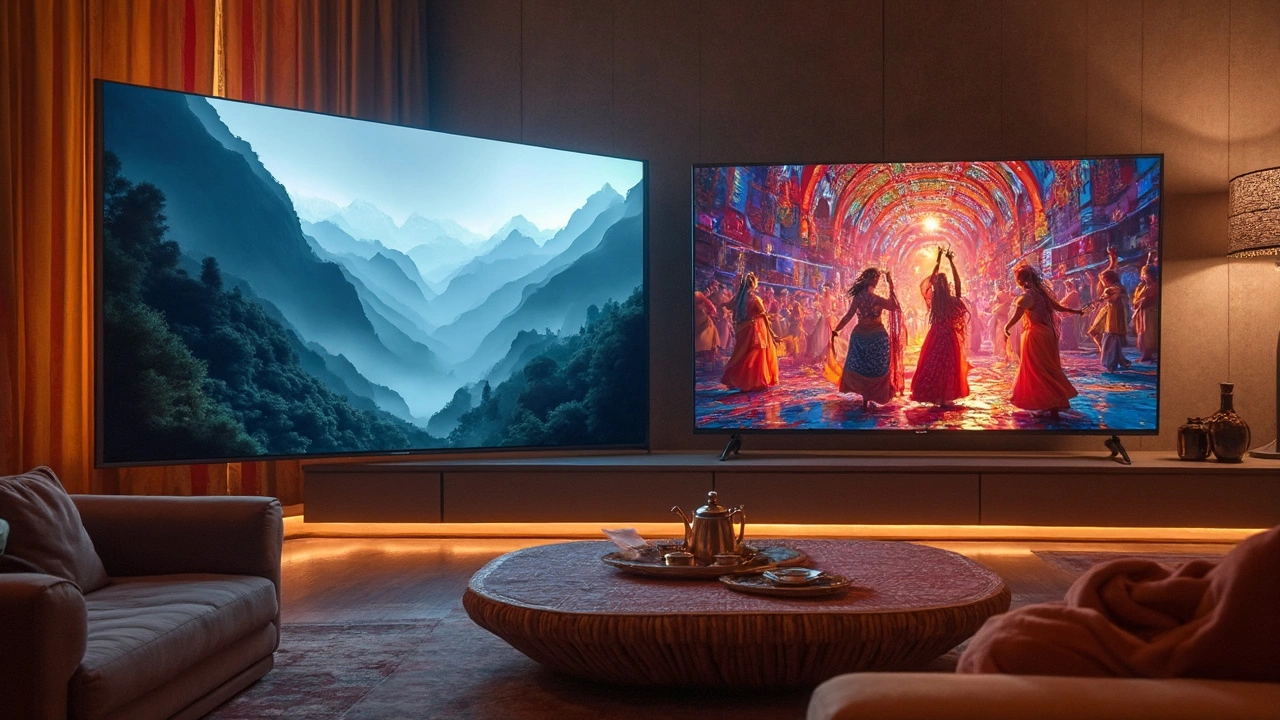
So, you’re in the market for a new TV and stumbled upon the terms UHD and QLED, right? It can get a bit confusing, but don’t worry, we’ll sort it out together. When we talk about UHD, we're referring to Ultra High Definition - which is really all about giving you a sharper image with more pixels. Think of it as more details in everything you watch.
On the other hand, QLED (Quantum Dot LED) doesn't just aim for a clear picture but also focuses on richer colors thanks to those Quantum Dots. It’s like the TV equivalent of the difference between viewing a water painting and one colored with oil paints - both can be stunning, but they have different highlights.
Now, you might be wondering if this is just marketing fluff or if these differences actually matter when you’re sprawled out on your couch watching Netflix or catching the latest game. Let's cut through some of that noise and see which screen could be the right fit for your living room adventures.
- Understanding UHD and QLED Basics
- How Resolution Affects Picture Quality
- The Impact of Color and Brightness
- Price vs. Features: What Matters More?
- Which One Should You Choose for Your Needs?
Understanding UHD and QLED Basics
Diving into the world of 4K TVs, you'll notice two heavy-hitters: UHD and QLED. Both offer impressive upgrades over older models, but they stand out for different reasons.
What is UHD?
UHD, or Ultra High Definition, is all about resolution. It delivers four times the resolution of a standard 1080p HD TV. This means more pixels - about 8 million of them - bringing you greater detail and sharper images. UHD is like getting twice the upgrade from HD, allowing for more immersive viewing. Perfect for those who love clarity and detail, especially when watching nature documentaries or the latest blockbuster.
What is QLED?
Then there’s QLED, which stands for Quantum Dot LED. The magic here lies in its color capabilities. QLED TVs have a layer of Quantum Dots that enhance color and brightness. This technology allows for more accurate skin tones, deeper blues, and richer reds. It's like having a cinema in your living room with vivid, lifelike colors. Samsung is a big name in QLED technology, pushing for vibrant and punchy display experiences.
Comparing the Two
When comparing these two, it’s essential to understand where they excel. A UHD TV is the go-to if your focus is crisper picture resolution. If, however, you’re a fan of vibrant colors and high brightness, a QLED might be the better match. A typical UHD TV's picture will be less vibrant than a QLED, but for many, the extra sharpness is worth it.
Here's a quick comparison:
| Feature | UHD | QLED |
|---|---|---|
| Resolution | 3840 x 2160 pixels | 3840 x 2160 pixels |
| Main Advantage | Sharper Detail | Enhanced Color |
| Popular Brands | LG, Sony | Samsung |
With these basics covered, you have a good foundation to decide which technology might complement your home entertainment setup better. The choice between UHD and QLED ultimately comes down to what you value most in your viewing experience.
How Resolution Affects Picture Quality
When we're talking TV resolution, what we're really diving into is how UHD gives you a stunningly crisp and clear image by ramping up the pixel count. Essentially, more pixels mean more detail, so everything from your favorite movies to sports broadcasts comes through with richer clarity.
UHD, standing for Ultra High Definition, equates to 3840 x 2160 pixels. That means it has four times the resolution of the older Full HD screens. It's like trading up from regular spectacles to a high-definition lens for your eyes.
A report from Display Experts International put it simply:
Viewers are now able to appreciate details and textures that never appeared on their screens before, thanks to the enhanced resolution of UHD technology.
More Than Just Pixels
While resolution is a big deal, keep in mind that it's not the only factor in picture quality. Screen sizes and seating distance come into play too. If you're sitting too far, the UHD benefits might be lost to you. On a 55-inch TV, to really take in the UHD experience, experts suggest sitting about 5 to 8 feet away.
- For smaller TVs, the pixel difference might not be as noticeable.
- With larger screens, UHD shines because you can see four times the detail of 1080p.
In essence, if you're going big—as many folks do nowadays—strongly consider a UHD option.
And let’s not forget the content. TV broadcasters and streaming services are catching on, with many 4K options available now. It's not just about owning a snazzy TV; it's about experiencing TV the way it was meant to be seen.
So, does resolution affect picture quality? Absolutely. And in the world of 4K, it's laying down the groundwork for your in-home cinematic experience.

The Impact of Color and Brightness
When it comes to choosing a TV, color and brightness play a huge role in the viewing experience, often more than we realize. With a QLED TV, you’re getting something that can seriously enhance these two aspects. Why? Because of those Quantum Dots I mentioned before.
These tiny dots boost the display's color accuracy, offering a wider spectrum than what you'd normally get. This means you’ll see more subtle shades and gradients, making nature shows and animated movies pop right off the screen. And it’s not just about more colors; it’s about the right colors showing up exactly where they should.
Brightness Matters Too
Brightness is where QLED really shows its muscles. These TVs use a backlighting system with LEDs that get incredibly bright. This comes in handy if your living room has lots of natural light, as a brighter screen means less glare and easier viewing throughout the day.
But don’t count UHD out just yet. While it mainly focuses on resolution, many UHD TVs today have improved panel technologies that offer vibrant color but may fall slightly short of QLED in extreme brightness or color richness.
Comparing Color and Brightness: UHD vs. QLED
| Feature | QLED | UHD |
|---|---|---|
| Color Range | 100% color volume in the DCI-P3 range | Varies, typically less than QLED |
| Brightness | Up to 2000 nits | Varies, usually less than 1000 nits |
So, if vibrant colors and intense brightness are what you're after, QLED might be the way to go, especially if you find yourself constantly tweaking the brightness settings. But remember, what's important is how these features matter to your viewing habits and environment.
Price vs. Features: What Matters More?
When you're thinking about getting a new TV, the money question inevitably pops up. Is it really worth splurging on a QLED when a perfectly good UHD is sitting right there, possibly cheaper?
First, let's talk dollars and specs. On average, QLED models tend to run higher in price than their UHD counterparts. That’s mainly due to the fancy Quantum Dot tech that promises brighter and more vivid colors. If you're someone who watches TV in a brightly lit room, this could be a deal-maker.
Features that Justify the Extra Spend
QLED TVs offer more than just pretty colors. Many models come with more advanced motion smoothing, which is fantastic for sports or action-packed movies. You also might find better gaming features, like super-low input lag and higher refresh rates, which gamers absolutely love.
UHD: Bang for Your Buck
However, don’t knock UHD, especially if you're on a budget. UHD TVs offer 4K resolution, which is great for streaming and Blu-ray, and many come with smart TV capabilities. They’re also increasingly adopting things like HDR (High Dynamic Range), which enhances color and contrast without the steep price of a QLED.
In the end, choosing between QLED and UHD often comes down to what you value most. If superior color quality and peak brightness are high on your list, you might consider the investment in a QLED. But if you just want to enjoy crisp, clear images at a lower price, a UHD should do the trick.
Remember, prices can fluctuate based on brand and model, so keep an eye out for sales. You might score a QLED at a UHD price if you’re lucky!

Which One Should You Choose for Your Needs?
Choosing between UHD and QLED really depends on what you value most in a television. Are you a movie buff who craves those vibrant, lifelike colors and brilliant brightness? Or is crisp detail in every frame your top priority? Here’s a way to look at it:
For the Movie Lover Who Adores Color
If you're all about the experience and want those colors to pop, a QLED might be your match made in heaven. These TVs, especially from brands like Samsung, offer stunning color quality that can make even mundane scenes feel cinematic. Quantum dots help deliver better brightness, which is great if you often watch TV in well-lit rooms.
For Those Who Crave Detail
On the flip side, if it's the detail that matters most—like being able to see every tiny bead of sweat on your favorite action hero during an intense chase—then a UHD setup could be perfect. These are ideal if you sit pretty close to the TV and want to lose yourself in that high-definition sweet spot.
Considering Your Budget
Let’s not forget about what your wallet is saying. Generally, QLED models can be pricier than their UHD counterparts. So, if you're on a budget but still want a decent upgrade from standard HD, UHD gives you bang for your buck without emptying your pockets.
Room Lighting Matters
An important factor many overlook is room lighting. If your TV room is bright with lots of windows, QLED would handle such environments better due to its brightness. However, if your room is more of a cozy cave, both options work well, and it might come down to your specific picture preference.
- UHD Pros: Better detail in an unlit room, generally cheaper
- QLED Pros: Superior color and brightness, excellent for lit rooms
Ultimately, the choice between these two isn’t about better or worse—it's about what makes sense for how you watch TV. Factor in what kind of content you consume most, where you’ll watch it, and your budget to find the sweet spot that’ll make your screen time a delight.